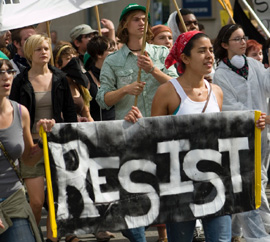Outpouring of Protests, then Police "Payback" at G-20 Meeting

A summit meeting of the Group of 20 in Pittsburgh last week was faced with an outpouring of challenges from social movement activists, community groups, and unions. The G-20 brings together finance ministers and political and economic advisors of the world’s top 19 most economically developed countries, plus the European Union. Heads of state join them at summits, too. Attendees of the G-20 meeting, which is widely seen as representing the interests of multinational corporations, were confronted with demonstrations and educational forums about corporate globalization. Activists organized a three-day Peoples’ Summit at the beginning of the week, attended by 700-800 people. Speakers included Mexican labor leader Benedicto Martinez and historian Howard Zinn, who called on organizers to respond to “the bigwigs of finance and industry who are trying to determine our fate” with an agenda of “what working people need,” based on “solidarity across national lines.” Other speakers were from the Steelworkers and the Pittsburgh teachers union. A 500-person march for jobs organized by Bail Out the People drew endorsements from the Steelworkers and the United Electrical Workers (UE). The UE also helped organize a series of forums on corporate globalization. The week was full of demonstrations, vigils, and educational efforts by a progressive and ecumenical religious coalition, women's peace organizations, unemployed workers, and environmentalists. Give $10 a month or more and get our "Fight the Boss, Build the Union" T-shirt. Public officials and news media—in particular TV news—spent the months leading up to the G-20 stoking fear about the protests and predicting violence. Outside police agencies augmented Pittsburgh’s 900-officer police department, creating a security force of 4,000 police and 2,000 National Guard troops. One columnist noted it was the largest mobilization of armed force in southwest Pennsylvania since 8,000 National Guard troops were sent to crush the Homestead steel strikers in 1892. Accordingly, media attention focused on several anarchist-led confrontations on September 24. Their non-permitted actions drew about 1,500 people before several thousand heavily armed, and armored, police used tear gas and pepper spray, while arresting 40. More impressive was the peaceful Peoples’ March drawing 8,000 participants at the end of the week. It was initiated by the Thomas Merton Center, a local peace and justice group. Public school teachers from around the city, members of the Pittsburgh Federation of Teachers, marched alongside parents, students, and community members. The three-mile march was punctuated by three rallies, each co-chaired by labor musician Anne Feeney and UE’s Al Hart. On Friday evening at the University of Pittsburgh, police led an unprovoked, yet highly coordinated assault on students and others. Many saw this as “payback” from militarized and hyped-up police who had anticipated large-scale street battles that never materialized. More than 100, including bystanders and journalists, were arrested. The assault has been widely denounced, including by the Newspaper Guild of Pittsburgh (CWA Local 38061), representing employees of the Pittsburgh Post Gazette. It noted that “many of those arrested were attempting to lawfully exercise their First Amendment rights of peaceful assembly and of press freedom, rights that are essential to the survival of democracy.”
SUPPORT LABOR NOTES
BECOME A MONTHLY DONOR
Kipp Dawson is an executive board member of the Pittsburgh Federation of Teachers. Al Hart is editor of UE News, the publication of the United Electrical Workers. Paul Le Blanc is a member of the National Writers Union (UAW Local 1981).





